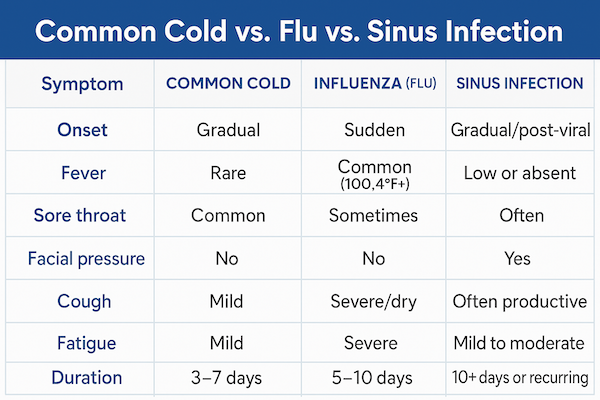Preparing for cold & flu season (from an ENT’s Perspective)
Protect your sinuses, throat, and whole respiratory system this fall.
Most guides focus on tissues and hand sanitizer. This one goes deeper.
As flu season approaches, most people are bracing for a spike in sore throats, coughing, and body aches. But if you're prone to sinus infections, hoarseness, or trouble breathing through your nose, the usual advice isn’t enough. Cold and flu season affects everyone differently—but for some, it’s more than a week on the couch. It can trigger serious complications, flare-ups of chronic medical conditions, or lingering symptoms that hijack your sleep, taste, and mood.
This guide is built around what really helps: protecting your respiratory system, supporting your immune function, and knowing when to seek medical care. Whether you’re a parent, caregiver, performer, teacher, or just trying to avoid using up your sick days, this is the checklist you’ll want.
What Makes Cold & Flu Season Worse for ENT Health?
Seasonal flu and contagious respiratory illnesses tend to spike in the fall and winter. Here’s why:
- Dry air inflames your nasal passages and vocal cords.
- More time indoors = more close contact and virus spread.
- Cooler temps let viruses survive longer on surfaces.
- Lower humidity dries out the mucosal lining of the nose, which is your first defense.
The result? Colds last longer, coughs hit harder, and your sinuses are more likely to get infected. Many patients also notice worsening allergy symptoms or voice fatigue during this time.
Cold, Flu, or Something Else? Know the Signs
Understanding the difference can help you avoid delays in treatment—or prevent unnecessary antibiotics.
Stay Ahead of the Symptoms: Prevention That Works
The flu virus can hit hard, but healthy habits can protect your whole family. Here’s how to prepare:
1. Get the Flu Shot Early
- The flu vaccine takes about two weeks to become effective.
- Recommended for everyone 6 months and older—especially older adults and those with chronic medical conditions.
2. Practice Smart Hygiene
- Wash hands frequently (sing Happy Birthday twice).
- Avoid touching your mouth and nose.
- Use hand sanitizer when soap isn’t available.
- Cover your mouth with a tissue or your elbow when you sneeze or cough.
3. Strengthen Your Immune System
- Eat nutritious food with a balanced diet rich in antioxidants.
- Drink plenty of fluids to stay hydrated.
- Sleep at least 7–8 hours each night.
- Stay physically active (even gentle walks help).
4. Prepare Your Medicine Cabinet
- Stock up on tissues, paper towels, cough drops, and over-the-counter medicines.
- Keep pain relievers (acetaminophen or ibuprofen) on hand for muscle aches or fever.
- Have a thermometer, humidifier, and nasal spray ready.
5. Avoid Spreading Germs
- Stay home when you feel sick—even with mild cold and flu symptoms.
- Sanitize frequently touched surfaces (remotes, phones, doorknobs).
- Skip close contact or handshakes when viruses are circulating.
ENT Tips: Caring for Your Nose, Throat, and Ears
When your respiratory system is under attack, your ENT health needs extra support. Here’s what we recommend:
- Rinse your nose with saline daily to reduce viral load and keep passages clear. Learn about chronic sinusitis care.
- Use a humidifier to prevent your throat and vocal cords from drying out.
- Don’t whisper when hoarse—it puts more strain on vocal folds. Voice care options.
- Treat early signs of ear pressure with nasal sprays or antihistamines. CT imaging may be recommended in some cases.
- Avoid smoking, which weakens your respiratory defenses.
If you experience persistent dizziness, ear pain, or loss of smell—don’t wait. These could indicate serious complications or an infection that needs ENT care. Dizziness & vertigo · Anosmia · Allergy testing
When to Seek Medical Care
Sometimes rest and fluids aren’t enough. Contact a primary care provider or ENT specialist if you:
- Have symptoms that last more than 10 days
- Develop a fever above 102°F that doesn’t respond to medicine
- Experience painful swallowing or trouble breathing
- Notice facial swelling or persistent sinus pressure
- Have a chronic cough or sore throat that won’t go away
- Lose your voice or smell for more than 2 weeks
These symptoms may point to sinusitis, bronchitis, laryngitis, or complications of influenza—each of which requires targeted treatment.
How LAENT Supports You During Cold & Flu Season
We see hundreds of patients each year during cold and flu season—many with lingering symptoms that didn’t respond to basic care. Our goal is to treat not just the illness, but the system it affects.
Depending on your case, we may recommend:
- Nasal endoscopy or sinus imaging
- Allergy testing to rule out chronic triggers
- Treatment for voice and throat strain
- Medication adjustments for underlying conditions
- Customized prevention plans for high-risk patients
You don’t have to push through painful symptoms or guess at the right approach. Our ENT doctors in Los Angeles share more about our team and services.
Final Word: Protect the Whole Family This Season
Preparing for cold and flu season isn’t just about avoiding illness—it’s about shortening recovery, avoiding complications, and supporting your long-term health.
Keep your respiratory system strong. Listen to your symptoms. And when something feels off, don’t wait to get help.
Contact LAENT today to get ahead of cold and flu season with a personalized ENT care plan.
FAQs
What’s the difference between flu and cold symptoms?
Flu symptoms are more intense and come on faster—fever, muscle aches, and exhaustion are more common. Colds are milder and build gradually.
Should I still get vaccinated if I’m healthy?
Yes. The flu shot protects not only you, but also those at higher risk, like children and older adults.
Can I treat cold and flu with over-the-counter medicines?
You can manage symptoms (like sore throat, fever, and congestion) with OTC meds, but they won’t treat the virus itself.
Does nutrition really affect immunity?
Yes. A balanced diet with fruits, vegetables, and whole grains supports your immune system and recovery time.
What are signs of flu complications?
Chest pain, confusion, severe dehydration, and persistent dizziness are red flags—especially if you have a chronic illness.


























